#but i choose to choose being chill and just in awe of the costume department
Text
I’m probably a little late to the party (heh) but there’s something I’ve noticed concerning color theory and Max, and Max in general
When she is introduced to us as MADMAX, her situation with Billy makes her feel lonely and angry. She’s wearing red clothes (with a white stripe!) and her hair is down (letting her rage roam free).
In here, she’s clearly annoyed. She’s just left Billy’s car, Mr. Clarke made her stand before the class and named her Maxine when she just wanted to melt into the background and get over her first day at an unfamiliar school, still not thrilled about having to move from California.
Still, she’s zipped down, since those people didn’t do anything especially hurtful towards her and maybe she’s a little hopeful about them.
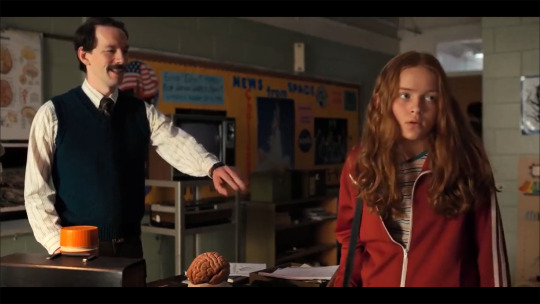
When she’s mad after an interaction with Billy she’s wearing red:
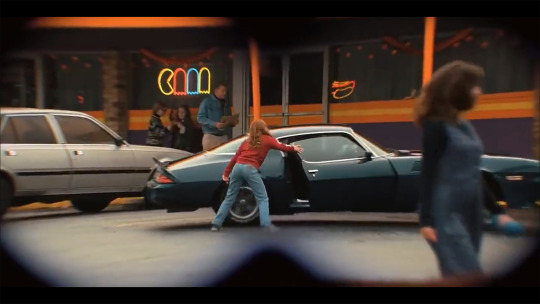
Darker red! She’s at school where she won’t have to deal with Billy for a while. She’s cooling like lava but there’s still one streak of the anger in the back of her head.
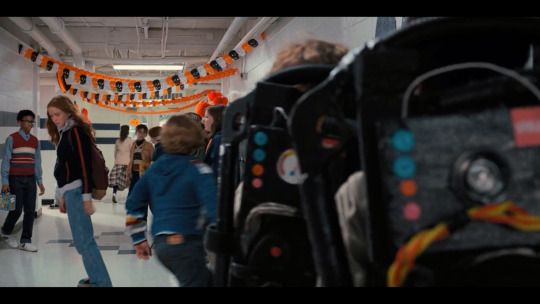
When the boys approach her, her zip-up sweatshirt is unzipped to show some of the color underneath. She’s happy! She will not let her guard down completely but she won’t hiss at them immediately! Still, she’s ready for disappointment and snapping right back to being fully red.
Yellow is not a lighter shade of red, but it’s definitely close on the color wheel. Closer to white, too! She is showing she’s not only mad, there also is softness inside her! It’s still a shade connected to red (anger) but yellow by itself is more of a happiness color. She wants to make friends but is still scared because of the new environment and Billy.
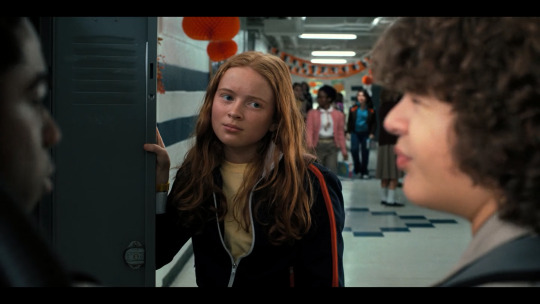
In the car with Billy (the scene where he wants to run over the party), the entire scene is shot in a way that’s barely letting us see her clothes. It’s mostly covered by hair, too, but we can see it’s still at least a little unzipped as there’s a bit of the yellow collar visible.
In the scene, she’s defending Hawkins saying, that it’s not that bad and that she can’t see any cows (yellow). She’s scared of Billy, so she’s trying to cover up her sympathy towards Hawkins and towards the boys (with red and her hair, Billy saw her get out of the car with the sweatshirt zipped up and hair down, now she’s covering her softness with what is familiar to Billy, so that he doesn’t see anything has changed, notice that softness and hurt her. That’s exactly what she does when she says she doesn’t know the boys trying to protect them from getting ran over).
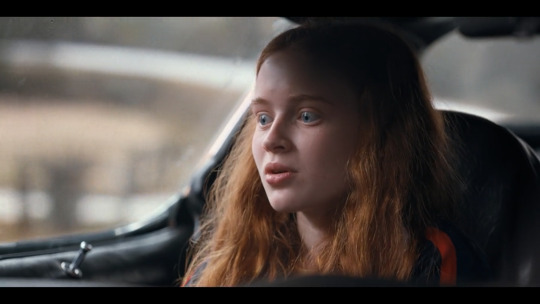
Yellow! Fully yellow :) She’s happy to be shown weird pollywog-like creatures with the rest of the Party!
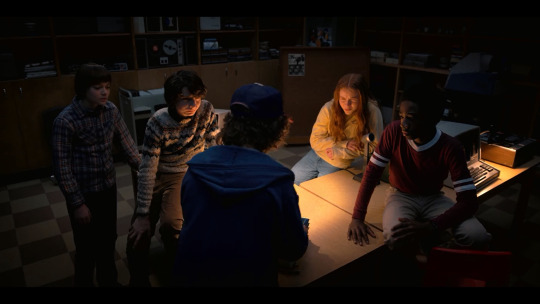
Right after Will gets possessed, her question as to what “true sight” means gets brushed off by all of the boys. She’s hurt and feels excluded, but her hurt makes her angry again. Next time we see her, she’s all red again.
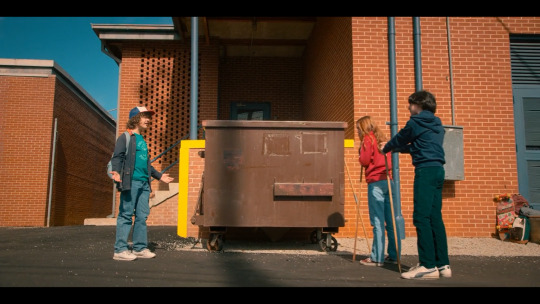
“Party members only! This is non-negotiable.”

“I thought you guys wanted me in your Party!”
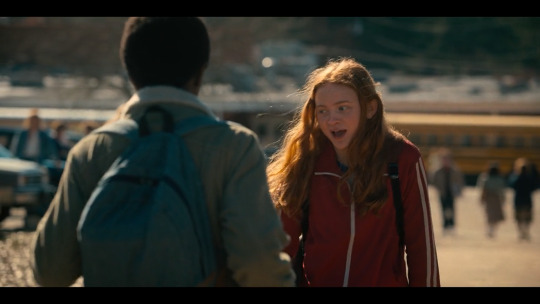
At the arcade! She’s already acclimated to Hawkins, and the arcade is her favorite place.
Alright, I’m getting tired and my third eye is slowly closing, so I’m going to wrap this up quickly, since I think I presented what the gist of the idea is.
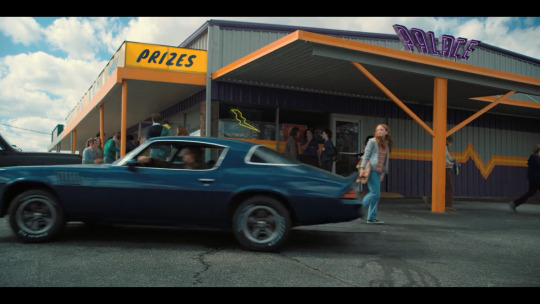
In season 3, yellow, patterns, colors! She is now fully a member of the party! She has friends, she knows the secrets, El is back. This is the happiest she’s been.
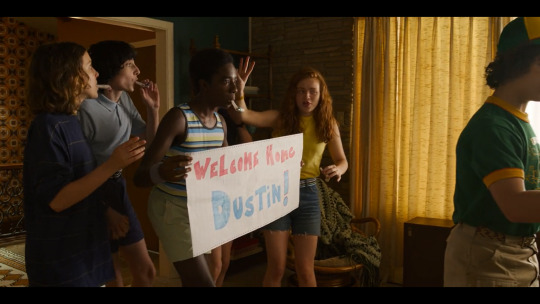
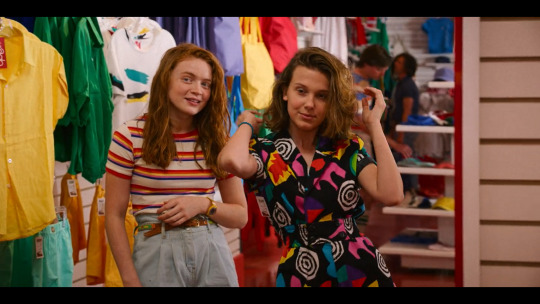
Clothes are important in both of the girl’s characters! (El changes from murky colors to vivid patterns when she finds herself and there’s a post about El shedding layers of blue in season 4. I’d link it but can’t find it, I’m sorry!) There being a scene like this, with them fooling around with their clothes is basically the peak of happiness :)


Here Max gets really worried because of Billy. She’s feeling a bit guilty ‘cause that’s her step-brother that’s sowing chaos and hurting her friends. El is straining herself. The situation is looking BAD. Blue!
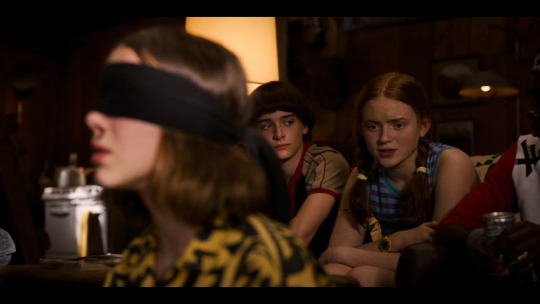
Beginning of season 4
Blue - she’s grieving and feeling guilty, Black coat - she’s hiding herself in a shell. She’s not particularly hiding her grief but she can close off at any moment.
(Btw Lucas is also wearing a blue shirt with some coats. I’d say he is sad because Max dumped him and doesn’t want to tell him things but the coats have a couple of colors because he’s hiding away his nerdiness in order to be cool :)
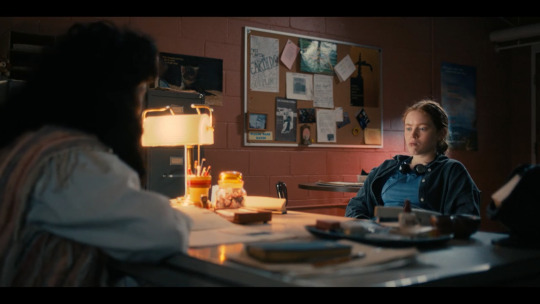
Now, the overcoat is blue with yellow elements - Max is being honest about her grief. She’s targeted by Vecna, the Hawkins gang knows she is SAD. It’s her last day, she can unfurl. The sweatshirt is unzipped and showing red and white underneath, the same colors we’ve seen her wear when we first met her. The girl that slammed the door of Billy’s car. The one that was scared of him. That girl is still inside Max.
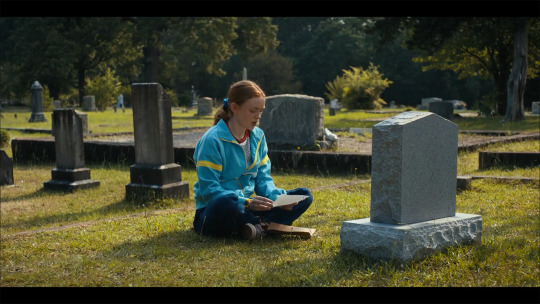
Sometimes, she’s wearing this. Grief covered up with brownish-reddish... Red. She’s going back to her previous self, she is talking to Lucas again and he SEES her... But to get that shade of red you go more towards black on the color wheel. She’s not that vivid, fiery red anymore. There are bits of that girl deep inside her, but she’s too tired to make it her entire self. She’s tired.

#idk if this makes sense#i did not do research befor this i literally got this idea while changing clothes#and it works for the most part#maybe a bit delusional here and there#but i choose to choose being chill and just in awe of the costume department#i am also pretty sure you beautiful people have decoded this long ago#since the color theory makes a big part of the show#either way i love max#if she doesn't wear the prettiest colors in s5 then why should i live to see it#i hope SHE will be able to see it though#although blind max is beautiful; she doesn't deserve it :(#max mayfield#stranger things#lumax#elumax#elmax#not really color theory because i don't know the color theory :) literally just vibes#aaand i'm not gonna reread what i've written cuz i'm tired. hope it makes any sense.#but you're smart too so you can probably get the gist of what i was trying to say
535 notes
·
View notes
Text
The Handmaid’s Tale 4x01-4x03
After three seasons and change of The Handmaid’s Tale, I think the facts of the matter are plain: what started out as a wrenching examination of how life under a totalitarian regime wears away at the soul and sense of self, and how the only possibilities for rebellion or escape within that system are minuscule and often self-defeating, has become a grown-up Hunger Games with prestige TV writing and acting. Except that for some reason, the writers are bizarrely reluctant to pull the trigger on that, so they keep falling back on the forms of that first show, even though they’ve been hollowed out of any meaning. Which is how you get this stretch of episodes, in which June starts out on the run with the other renegade handmaids, ends up on the run with (only one surviving member of) the other renegade handmaids, and in the middle both commits an audacious poison attack against Gilead and gets captured and tortured into giving up her friends.
And before we talk about the substance of all that, it must be acknowledged that most of it is just incredibly stupid. It’s simply absurd that Joseph Lawrence hasn’t been executed (at the very least, you’d expect him to have gone under the knife; Janine’s former Commander lost a hand for raping her, after all). It’s simply absurd that Gilead wouldn’t kill June immediately, or at least after she’d lied to them for the first time. It’s simply absurd that the handmaids wouldn’t try to move out of the new safe house, knowing that June could give them away (remember when Alma was the Mayday contact and June was the naive one? Now she’s so passive that she has to be told everything). It is beyond absurd that Gilead’s reaction to a group of rebellious handmaids who have stolen eighty-six children is to send them - together! - to a compound in the middle of nowhere. And I don’t even know what to say about the idea that these same women would be transported with minimal security and restraint, or that a passing cargo train would be enough to ensure June and Janine’s escape. At almost every turn, the plot developments in these episodes feel like they exist to produce a cool montage or yet another opportunity for Elisabeth Moss to suffer beautifully, not as a meaningful exploration of totalitarianism and resistance.
Having said that, there is good material in these episodes, and especially their suggestion that in becoming a leader of the renegade handmaids, June has placed herself in direct contrast to - and yet also modeled herself on - Aunt Lydia. The scene in which she arranges a particicution of the Guardian who raped Esther is as chilling as it is righteous, not because the murder is wrong, but because she so clearly recognizes that the way to get the other handmaids to do what she wants is to use the rhetorical and emotional handholds that Lydia beat into them. It’s notable how she’s styled, and how she moves, in the season’s first episode - all in ways that seem designed to echo Ann Dowd’s performance.
Esther herself is a really brilliant addition to the series (and it’s baffling to me that she was written off so quickly - perhaps she’ll return?). She forces June to play multiple roles - the subservient Handmaid/Martha to Esther’s Wife; the stern but loving maternal figure to an abused child desperate for attention and care; most interestingly, the role of an Aunt, who earns Esther’s loyalty by directing her violence and rage at the right target. It’s also, of course, yet another reminder of what Gilead is actually about, and of the fact that just as women like June are considered a stopgap measure, so are women like Serena. The real Wives of Gilead are children like Esther, too young and ignorant to say no or have a mind of their own. And if the result is rape, trauma, and psychological harm, then so be it.
At the same time, these episodes are also about June the increasingly mythical figure, both inside Gilead - the Mayday contact at Jezebel’s who is awed to meet her and inspired by her to make a possibly suicidal stand - and outside of it. And they’re about the weight that it puts on Luke and Moira’s shoulders to love, from afar, a woman who is a hero of the revolution. It’s a nice counterpoint to the show’s mythologizing of June that they are allowed to express how frustrating it is to have to deal with the fallout of her heroism. (Though some of their complaints are hard to sympathize with; yes, Moira, June probably did not think about the fact that some of the children she rescued from Gilead would remember no other home and want to go back; does that mean she should have left them to become illiterate child-brides and brainwashed rapists?) If you’re going to do The Hunger Games, at least acknowledge that real-life Katnisses can be as exhausting as they are inspirational.
And look, for all my grousing, it’s not as if there isn’t a good story to be told about June, the renegade handmaid who turns herself into Gilead’s scourge. The show’s styling already works hard to recall WWII, and the references to slavery also abound. Both of those periods have no shortage of stories about awe-inspiring heroism from within the belly of the beast, and if The Handmaid’s Tale struggles with plotting stories like this (and if placing a middle class white woman at their center is a choice with some obvious drawbacks) that doesn’t mean they can’t be entertaining and inspirational to watch.
Which makes it all the more frustrating that the third episode winds us all the way back to where we’ve been so many times in the last three seasons, with June in the clutches of the Gileadean security state. A situation that is treated, yet again, as an opportunity for the show’s costuming and set-dressing departments to imagine yet another level of Gilead’s color-coded oppression. I thought Atwood’s The Testaments was a rather pointless return to the world of the original novel, but one thing it grasps, which the show never has, is that Gilead was never meant to look elegant or cool. Its outfits and neologisms were meant to come off as cheap and chintzy. The show, in contrast, simply loves inventing new and increasingly elaborate settings, and putting June in new outfits, whether or not this takes the story anywhere interesting.
There’s a bit of fun to be had in the fact that June is so clearly over Aunt Lydia’s sickly-sweet mind games, but in the end it feels pointless - just a way of getting Moss to play against some of the show’s heavy hitters again, repeating the same beats we’ve seen so many times before. And sure, Lawrence’s line - “Gilead doesn’t care about children. Gilead cares about power.” - is a good one. But it’s also something we know. I suspect it’s something June knows - the only reason she denies it is that she doesn’t want to accept that she’s going to have to choose between her compatriots and her daughter.
And in the end, we’re right back where we started, with June on the run, except now only with Janine (conveniently, the other handmaids are killed before they ask any uncomfortable questions about how they were captured; and Janine just happens to be the character least likely to question or criticize June). So it remains to be seen whether this season will actually take the leap and become the adventure show it has so clearly wanted to become, while clearly being embarrassed by that desire. Or whether we’re in for another season of pointless runarounds.
(I will say nothing about Serena’s pregnancy except that I’m a bit surprised she and Fred were still having sex. Otherwise it continues to amaze me that the show thinks we should still have any interest in her - but at least someone actually comes out and tells her that Nichole isn’t her daughter. I will also say nothing about the June and Nick of it all. My stance continues to be that June should take what pleasure she can get in her uncertain life, but if the show wants me to be invested in their romance, sorry, that’s where I get off.)
28 notes
·
View notes